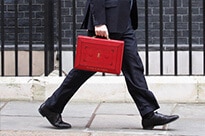7th August 2015
7mins
Osborne’s stamp duty chickens come home to roost
 When Chancellor George Osborne announced reforms to Stamp Duty last December, we warned that his hiking of the property tax on homes worth more than £937,000 would slow the top of the market. The evidence is in, and we were right. But the policy has also backfired on its own terms: not only have the changes to the Stamp Duty Land Tax (SDLT) cast a pall on the £3 million-plus market, but they’ve also increased competition in the sub-£1 million section of the market, and they’ve appeared to have reduced the tax-take to the Treasury. Figures from leading agents show Prime Central London property transactions in the second quarter down almost one-third on the same period last year. Prices are anemic, down 0.7% year-on-year, although up 1.6% on the previous quarter, according to Savills.
When Chancellor George Osborne announced reforms to Stamp Duty last December, we warned that his hiking of the property tax on homes worth more than £937,000 would slow the top of the market. The evidence is in, and we were right. But the policy has also backfired on its own terms: not only have the changes to the Stamp Duty Land Tax (SDLT) cast a pall on the £3 million-plus market, but they’ve also increased competition in the sub-£1 million section of the market, and they’ve appeared to have reduced the tax-take to the Treasury. Figures from leading agents show Prime Central London property transactions in the second quarter down almost one-third on the same period last year. Prices are anemic, down 0.7% year-on-year, although up 1.6% on the previous quarter, according to Savills.
The estate agent pegged the price falls on a combination of Osborne’s SDLT changes, and the pre-election threat of a Mansion Tax from the Labour and Liberal Democrat parties. “Following the Conservative Party election victory and with the threat of such a tax removed, the full effect of the stamp duty changes are becoming clear,” Savills notes.
“It’s ironic that it’s a Conservative chancellor’s policies that are weighing on London’s property market,” says Camilla Dell, Managing Partner at Black Brick, “and it shows how wrong-headed his Stamp Duty reform has turned out to be.”
For a start, the changes to SDLT have pushed buyers into the sub-£1 million bracket, undermining the Chancellor’s goal of helping buyers at the lower end of the market. Prior to the reforms, an investor with £2 million to invest would have likely bought a single property. Now, a £2 million property would carry stamp duty of £153,750, while two £1 million properties would be taxed at £43,750 each – encouraging our £2 million buy-to-let investor to buy two £1 million properties and ‘save’ £66,250 in Stamp Duty.
Secondly, early signs are that the tax change will cost the Treasury in lost revenue. Research firm LonRes calculates that Stamp Duty paid for prime London sales is down 6.4% since the reform was introduced compared with the same period last year. “This illustrates what the Conservatives party has traditionally argued: if you increase rates of tax, you depress the market and end up with less revenue,” says Dell.
We are increasingly of the view that it will now take a major market correction – of perhaps 20% – to bring the Prime Central London market back to life, and we believe that correction is likely to take place over the next six to 12 months. “All it will take is a vendor or two to blink, and accept an offer at a substantially lower price-per-square-foot, and that will ripple through the market,” predicts Dell.
There are signs that prime developers are bracing themselves to drop the prices at which they are prepared to close on new developments, says Black Brick partner Caspar Harvard-Walls. “There’s a fair amount of new product coming to market over the next six months or so. Developers will have to show a bit more flexibility on pricing, and we’re starting to see that,” he says. “However, they won’t advertise the fact – so it’s important for buyers to work with agents who have the relationships with developers that allow them to secure discounted deals.”
The unexpected post-election gloom in the market could, however, be good news for prospective buyers, says Dell. “If you’re thinking about buying, your timing could be quite good. People always need to move, and people always need to sell – there could well be some buying opportunities to be had.”
Summer Budget-UK Prime Property Implications

Permanent non-dom status to be abolished The government is to abolish permanent non-dom status, which allows non-domiciled UK residents to avoid paying tax on offshore income. From April 2017, anyone that has been resident in the UK for 15 out of the last 20 years will be required to pay UK tax on their worldwide income.
Imposition of inheritance tax on UK residential property held by foreign-domiciled persons Inheritance tax at 40% will be payable on such properties from April 2017, whether that property is owned directly or via an indirect structure such as an offshore company or partnership.
Both of these moves are likely to encourage some non-domiciled individuals to leave the UK, and/or sell prime central London property. However, analysts believe the numbers involved are likely to be small, and with therefore little impact on the market.
Tax relief trimmed for buy-to-let landlords At present, landlords can claim 45% relief on mortgage interest payments. Over a four-year period starting in April 2017, that relief will be gradually withdrawn and restricted to the basic rate of income tax. While the move is unlikely to deter buyers who are focused on long-term capital appreciation, it does underscore the need to take professional advice to assess the effect on investment yield.
Cameron’s transparency call will see little change for foreign buyers

Most analysts believe that much of the information to be included in the new registry is already publicly available.We do not believe the proposals will add any additional burden to legitimate buyers seeking UK property. The UK remains fully open for business to overseas property buyers.
Property acquisition of the month: Atlas Building, City Road


“They think it will be fine leaving London, and that they can come back and visit all the time and that the family will adjust,” the investor said. Apparently not.
We would be delighted to hear from you to discuss your own property requirements. For a non-obligatory consultation, please contact us.